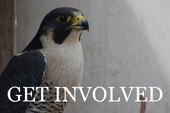Business slowed down a bit at BMW this past week. There were just 12 new admissions to bring the yearly total to 433, not quite double the number at this time last year. A young Barn Owl from Wapato brought the baby Barn Owl total to 164 (compared to 96 in 2014).
Gunshot Great Horned Owl
An x-ray taken at Pendleton Veterinary Clinic revealed the cause of blindness in the fledgling Great Horned Owl featured in last week’s journal. A single shotgun pellet passed through both eyes, permanently blinding the bird.

Haemoproteus
The new camera on the new microscope is finally up and running. Intern Jean took the photo below of the blood parasite Haemoproteus, sometimes called pseudo malaria, found in red blood cells of an emaciated Great Horned Owl admitted two weeks ago. The owl’s injuries were too extensive to treat. If that had not been the case, we would have used a human anti-malaria drug to treat the parasite.

Red-tailed Hawk with a swollen foot
An underweight fledgling Red-tailed Hawk was taken to Prosser Animal Hospital with a string tightly wrapped around her left foot. The string was removed and BMW volunteers transported the hawk to Pendleton. She has quickly responded to treatment and will soon be transferred to the hack site where she will join two other fledglings.


Ruptured Air Sac
A fledgling Crow was admitted with multiple injuries, including at least one ruptured air sac. Birds have a system of paired air sacs connected with the lungs that allows them to utilize oxygen far more efficiently than mammals. The air sacs also serve as a cooling system for the bird’s heat generating high metabolic rate. If an air sac is ruptured, usually by some type of trauma, the trapped air can be seen under the bird’s skin.

Thank You Volunteers
Although new admissions were down this week, BMW Volunteers still performed above and beyond the call of duty, searching for injured birds, sometimes unsuccessfully but not without great effort, and transporting them to the Pendleton or Tri-Cities Center for care.







